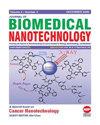Ras-Related Nuclear Protein-Binding Protein 9 Regulates Gastric Cancer Cell Cycle and Apoptosis Through the PTEN/PI3K/AKT Signaling Pathway
IF 2.9
4区 医学
Q1 Medicine
引用次数: 0
Abstract
We investigated the impact of RanBP9 on cell cycle progression and apoptosis in gastric cancer cells. RanBP9 expression was analyzed in 38 clinical gastric cancer tissues using Western blotting. Lentiviral transfection was utilized to establish GES-1 gastric cancer cell models that either overexpressed or silenced RanBP9. Cell proliferation and apoptosis were assessed using MTT and TUNEL staining assays, respectively. Apoptosis-related factors were analyzed by Western blotting and qRT-PCR. Flow cytometry and qRT-PCR were employed to evaluate cell cycle progression and the mRNA levels of CDK4/CyclinD1. The PTEN/PI3K/AKT signaling pathway was examined by Western blotting. We observed a significant reduction in RanBP9 expression in gastric cancer tissues. Overexpression of RanBP9 in GES-1 cells suppressed cell activity, enhanced apoptosis, increased Caspase3 expression and the Bax/Bcl-2 ratio, and decreased CDK4 and CyclinD1 expression, thereby preventing S phase entry. Conversely, knockdown of RanBP9 yielded opposite results. Furthermore, we found that RanBP9 negatively regulated the PTEN/PI3K/AKT pathway. Our findings demonstrate low expression of RanBP9 in gastric cancer tissues and cell lines. We have also established that RanBP9 negatively regulates the PTEN/PI3K/AKT pathway, resulting in cell cycle prolongation and promotion of apoptosis in GES-1 cells.ras相关核蛋白结合蛋白9通过PTEN/PI3K/AKT信号通路调控胃癌细胞周期和凋亡
我们研究了RanBP9对胃癌细胞周期进程和凋亡的影响。应用Western blotting分析38例临床胃癌组织中RanBP9的表达。利用慢病毒转染建立过表达或沉默RanBP9的GES-1胃癌细胞模型。分别采用MTT和TUNEL染色法检测细胞增殖和凋亡。采用Western blotting和qRT-PCR分析凋亡相关因素。采用流式细胞术和qRT-PCR检测细胞周期进展及CDK4/CyclinD1 mRNA表达水平。Western blotting检测PTEN/PI3K/AKT信号通路。我们观察到胃癌组织中RanBP9的表达显著降低。在GES-1细胞中过表达RanBP9抑制细胞活性,促进凋亡,增加Caspase3表达和Bax/Bcl-2比值,降低CDK4和CyclinD1表达,从而阻止S期进入。相反,敲低RanBP9产生相反的结果。此外,我们发现RanBP9负向调控PTEN/PI3K/AKT通路。我们的研究结果表明,RanBP9在胃癌组织和细胞系中低表达。我们还发现RanBP9负调控PTEN/PI3K/AKT通路,导致GES-1细胞的细胞周期延长,促进细胞凋亡。
本文章由计算机程序翻译,如有差异,请以英文原文为准。
求助全文
约1分钟内获得全文
求助全文
来源期刊
CiteScore
4.30
自引率
17.20%
发文量
145
审稿时长
2.3 months
期刊介绍:
Information not localized

 求助内容:
求助内容: 应助结果提醒方式:
应助结果提醒方式:


